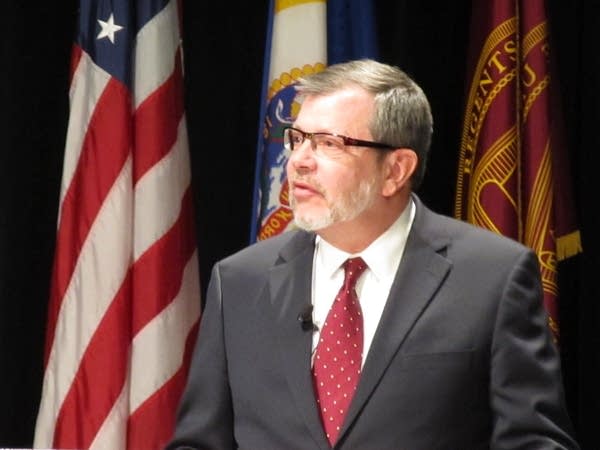U of M prez wants more U influence in neighborhood development
Go Deeper.
Create an account or log in to save stories.
Like this?
Thanks for liking this story! We have added it to a list of your favorite stories.

University of Minnesota President Eric Kaler says the U will try to shape the character of Dinkytown and other neighborhoods surrounding the U.
His remarks in today's State of the University address come after a rash of robberies in the fall semester, most of which happened to students just off campus.
Kaler told the audience a recent student-housing boom has created 7,000 units near the U, and another 7,000 are in the works.
"For too long,” he said, “we at the University have seemed not to care about development surrounding our Minneapolis campus, and that development, I believe, has attracted at least some of the crime we've experienced."
Turn Up Your Support
MPR News helps you turn down the noise and build shared understanding. Turn up your support for this public resource and keep trusted journalism accessible to all.
U officials have discussed the housing boom and its effect on the university community before.
Kaler said after the speech the U wants more involvement in discussions over topics such as neighborhood density, transportation and land-use planning.
He said it's not clear yet just what steps the U will take. But he said the U would like to work more closely with the city of Minneapolis, perhaps by providing experts from the College of Design or testifying at public hearings about projects near the U.
“We need a more planful conversation about how we’re going to manage the Marcy Holmes and Prospect Park neighborhoods, southeast Como, around the campus," he said. “I just think we need to be a much bigger part of those conversations than we’ve been in the past.”
Although the U hasn’t been doing enough to influence development in its neighborhoods, he said, universities in other states have.
In Philadelphia, he said, “the University of Pennsylvania really did remake part of the neighborhood around its campus. And it needed to do that for safety reasons and property-value reasons.”
Kaler regents will review in June his plan for working with the City of Minneapolis and the neighborhoods surrounding the U.
The president also touched on the concerns of some students that they’re being racially profiled, and pledged to improve the campus climate.
He said the U already has several programs to recruit and support more first-generation and low-income students, but “despite this work and our clear commitment, our record is alarming on attracting and retaining students of color -- particularly African-American men.”
Kaler said the share of African-American students on the Twin Cities campus "is less than four percent. And among African-American men, that percentage is lower."
He said campus leaders are trying to create better climate for students of color.
They have complained recently that police are engaging in racial profiling.
Kaler said he's ready to fund new diversity initiatives the U will roll out this spring and fall.


